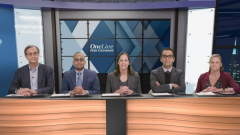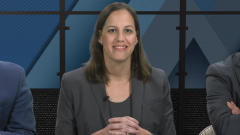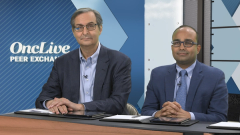
Combination Therapy in BRAF-Mutated mCRC: The BEACON CRC Trial
Expert perspectives on the BEACON CRC trial, which combined encorafenib, cetuximab, and binimetinib in patients with BRAF V600E–mutated metastatic colorectal cancer.
Episodes in this series

Transcript:
Kristen K. Ciombor, MD: Moving on to our next subtype,BRAF. BRAF in the metastatic setting for colorectal cancer [CRC] is a little more prevalent than HER2 [epidermal growth factor receptor 2] amplification, about 8% to 10% in some series. I’m sure this is true for you too, but it strikes fear in my heart knowing this because it’s such a negative prognostic factor. BRAF V600E–mutant patients typically have a very aggressive phenotype. We knew from the beginning that it was prognostic. But now we know it’s a predictive biomarker too, which is important and exciting.
Also, we have to keep in mind that we need to know which mutation it is. Is it truly V600E or 1 of the more atypical mutations? We typically detect that by NGS [next-generation sequencing] but also by PCR [polymerase chain reaction]. Certainly in the metastatic setting, we often can clinically tell—even before we know the results—that this may be a more aggressive BRAF. Dr Hecht, tell us about the BEACON CRC study and how that led to BRAF being a predictive biomarker in CRC.
Joel R. Hecht, MD: These are patients where something bad happens sometimes before they get treated. We all can think of patients who progressed while getting things set up. They don’t do particularly well with chemotherapy, though a subset do, and that’s really interesting. There is a subset of people with class 1 V600E mutations who don’t seem to do as poorly. But for the majority of them, the OS [overall survival] is terrible. Not that we’re doing so wonderfully in colon cancer, but [V600E is] terrible. I’m still not certain what to do with class 3 mutations and things like that, but most of them are V600E class 1 mutations.
Going way back, with Scott Kopetz we looked at single-agent BRAF inhibitors, which worked. [This includes] an old 1, vemurafenib. We screened 400 patients—BRAFis relatively uncommon—to get 20 patients and 1 short-lived response. A single agent doesn’t work particularly well, so biologically, colon cancer is really different from melanoma. There are feedback loops, and a lot of work from his and other labs show that the combination of blocking upstream with an anti-EGFR was much more effective than a single agent. To be honest, as the BEACON CRC trial shows, it’s much more effective than chemotherapy.
BEACON CRC asked 2 questions. No. 1, they compared this with standard second-line therapy. In this case, it was FOLFIRI [5-fluorouracil, leucovorin, irinotecan] plus cetuximab. Most of those patients had an irinotecan-based regimen, presumably because of the reasons you brought up before about hair loss and things like that. That also looked at earlier smaller trials, which had 2 drugs with an anti-EGFR. In this case, it was cetuximab with encorafenib, then adding a MEK inhibitor, binimetinib. There was a triplet arm and a doublet arm, and in some earlier trials looked like the triplet might be better. That’s why we do randomized studies. We do larger randomized studies. Three drugs is probably a little more toxic. Even though numerically there were some small differences, it looked as if the triplet and doublet were far superior to chemotherapy alone, but there wasn’t a huge difference between the triplet and the doublet.
That led to encorafenib and cetuximab. In our guidelines, no one felt that cetuximab vs panitumumab makes a difference, which is why your choice of anti-EGFR became the standard for these patients. The problem is that patients still don’t do as well as we’d like. We’re used to patients with CRC who live for a long time, with median survivals bumping up against 3 years in trials and the percentage of patients alive at 5 years continuing to increase. These individuals still don’t do well. This is what you see with a driver mutation, where you get resistance after a period of time. Yes, they do much better. The PFS [progression-free survival] was about 6 months, and OS was only 9 months, which isn’t so great in the second line but it certainly helps patients.
Kristen K. Ciombor, MD: It’s definitely a step forward. We need to keep working. Speaking of the mechanisms of resistance, Dr Kasi, tell us a little about what we’ve learned since the BEACON CRC study about what patients experience and what types of resistance we’re seeing.
Pashtoon M. Kasi, MD: In many ways, it builds on what Dr [Kanwal] Raghav mentioned about the EGFR challenge story. A lot of these are resistance mechanisms—the KRAS, NRAS, and MAP2 kinase mutations—that aren’t necessarily actionable till we get better drugs in that pathway. The other intriguing aspect, which is a known mechanism of EGFR, is the acquisition of MET and MET amplification with the drugs coming out. Obviously, these aren’t actionable findings. What I found intriguing with the data presented by the group is that in over 90% of patients at baseline, they were able to detect the BRAF V600E mutation on ctDNA [circulating tumor DNA].
This goes back to the question of identifying these patients early on. With first-line studies like BREAKWATER enrolling, early identification is helpful. From a mutation standpoint, if you’re able to detect it, you can then follow along. Unfortunately, a lot of these patients don’t do well, but there are anecdotal published reports from different groups. A few colleagues have published on the same mechanisms of loss of these clones, which may bring up the question of rechallenges, like the EGFR story. I hope it translates the same way as it is, but it’s different.
Joel R. Hecht, MD: In salvage [therapy for] colon [cancer], those patients do better, so you have longer for them to be off. The problem is that once these patients progress, they do poorly and crash quickly. Our salvage therapies are modestly active.
Pashtoon M. Kasi, MD: True.
Kristen K. Ciombor, MD: The early data coming out of [The University of Texas] MD Anderson [Cancer Center] with the BEACON combination plus nivolumab was interesting to see. We definitely look forward to seeing if that pans out in a randomized study.
Transcript edited for clarity.







































